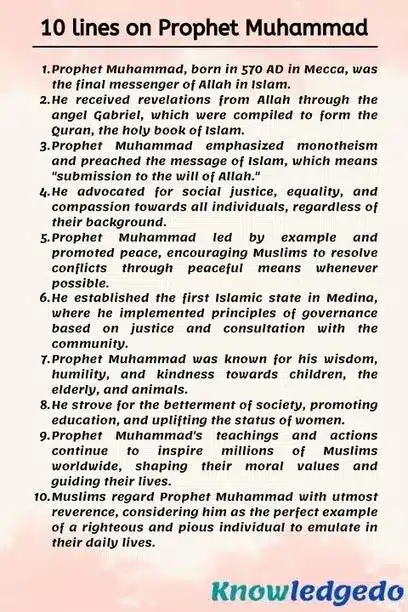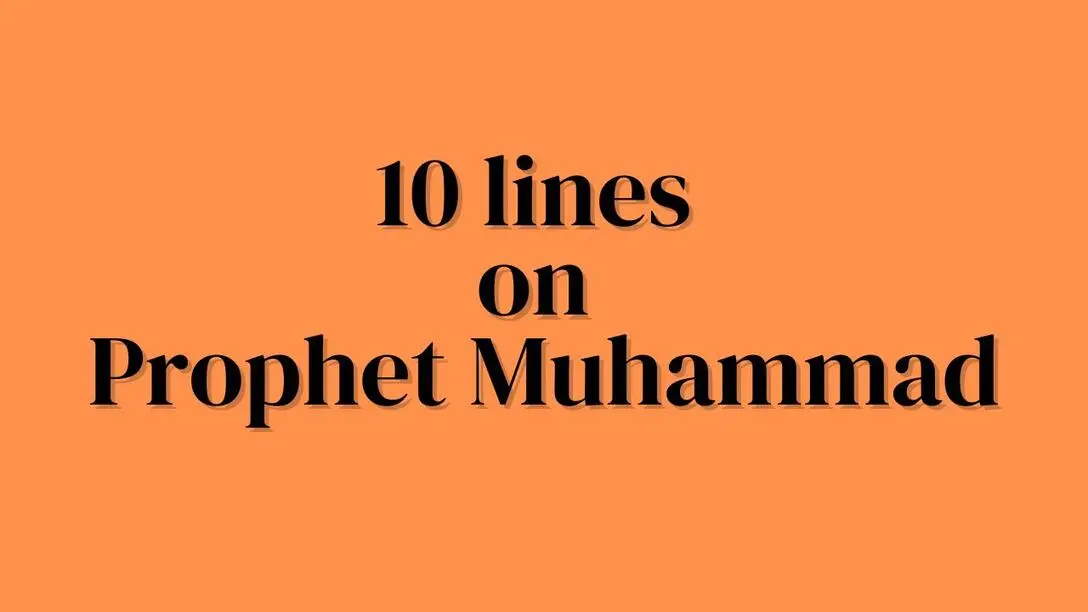Today, we are sharing 10 lines on Prophet Muhammad in English. This article can help students who are looking for information about 10 lines on Prophet Muhammad. This Lines is very simple and easy to remember. The level of these Lines is moderate so any student can write on this topic.
This article is generally useful for class 1,class 2,class 3,class 4,class 5,class 6,class 7,class 8,class 9,class 10,class 11,class 12
10 lines on Prophet Muhammad
1) Prophet Muhammad, born in 570 AD in Mecca, was the final messenger of Allah in Islam.
2) He received revelations from Allah through the angel Gabriel, which were compiled to form the Quran, the holy book of Islam.
3) Prophet Muhammad emphasized monotheism and preached the message of Islam, which means “submission to the will of Allah.”
4) He advocated for social justice, equality, and compassion towards all individuals, regardless of their background.
5) Prophet Muhammad led by example and promoted peace, encouraging Muslims to resolve conflicts through peaceful means whenever possible.
6) He established the first Islamic state in Medina, where he implemented principles of governance based on justice and consultation with the community.
7) Prophet Muhammad was known for his wisdom, humility, and kindness towards children, the elderly, and animals.
8) He strove for the betterment of society, promoting education, and uplifting the status of women.
9) Prophet Muhammad’s teachings and actions continue to inspire millions of Muslims worldwide, shaping their moral values and guiding their lives.
10) Muslims regard Prophet Muhammad with utmost reverence, considering him as the perfect example of a righteous and pious individual to emulate in their daily lives.

5 lines on prophet Muhammad
1) Prophet Muhammad was the last and final messenger of Allah in Islam, born in 570 AD in Mecca.
2) He received revelations from Allah through the angel Gabriel and compiled them into the holy book of Islam, the Quran.
3) Prophet Muhammad preached the message of monotheism, social justice, compassion, and peace.
4) He established the first Islamic state in Medina, implementing principles of governance based on justice and community consultation.
5) Prophet Muhammad’s teachings and actions continue to serve as a source of inspiration for millions of Muslims worldwide.
FAQ
Answer: Prophet Muhammad is considered the final messenger of Allah in Islam. He received revelations from Allah through the angel Gabriel, which were compiled into the Quran. He preached the message of monotheism, social justice, compassion, and peace, and his teachings and actions serve as the foundation of the Islamic faith and practice.
Answer: Prophet Muhammad played a pivotal role in the spread of Islam. Through his teachings, leadership, and example, he inspired and guided his followers to embrace the message of Islam. He established the first Islamic state in Medina, which served as a centre for spreading the faith. His companions, known as the Sahaba, played an instrumental role in spreading Islam to different regions, resulting in the rapid expansion of the faith during and after his lifetime.
Answer: Several notable events marked Prophet Muhammad’s life. The Night of Ascension (Isra and Mi’raj) is believed to be the journey he made from Mecca to Jerusalem and then ascended to the heavens. The Hijra, his migration from Mecca to Medina in 622 AD, was a significant turning point in establishing an Islamic state. The Battle of Badr, the Battle of Uhud, and the Treaty of Hudaybiyyah are among the key military and diplomatic events during his time.
Answer: Prophet Muhammad is highly revered and held in the highest esteem by Muslims. He is considered the ideal role model for Muslims to follow in their personal, social, and spiritual lives. Muslims honor and respect him as the best example of a servant of Allah, embodying virtues such as humility, kindness, justice, and mercy. Muslims often invoke blessings upon him and strive to emulate his teachings and character.
Disclaimer: The religious content provided on Knowledgedo.in is for informational purposes only. We strive to ensure accuracy, but it is essential to recognize that religion is a personal and subjective matter. The interpretations and beliefs within different religious traditions may vary. We encourage readers to consult reliable religious authorities for specific inquiries or guidance. Knowledgedo.in does not endorse or promote any particular religious beliefs or ideologies. Readers are responsible for their own interpretation and use of the religious content provided on the platform.
